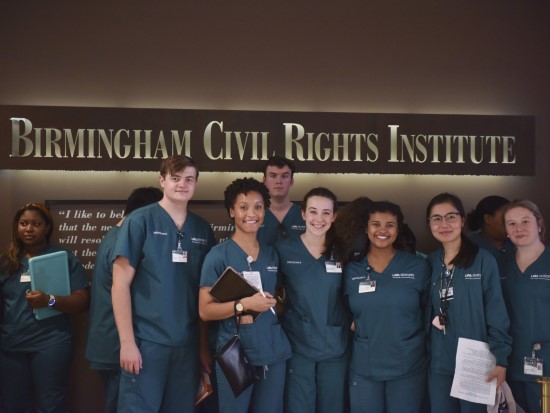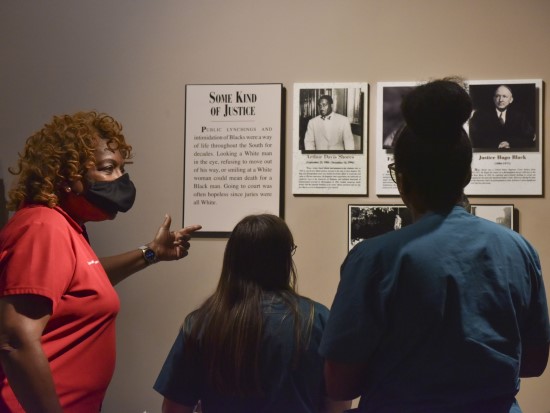
By Laura Gasque
University of Alabama at Birmingham School of Nursing students are learning the lessons of history and the impact of health disparities through the resources of the Birmingham Civil Rights Institute and a partnership with the Birmingham Black Nurses Association.
Instructor Elizabeth Crooks, DNP, RN, CNE (DNP 2013), has made it her goal for every Bachelor of Science in Nursing student to experience the BCRI. In June 2022, 130 BSN students visited to learn more about the civil rights movement and the role nurses play in leadership, advocacy and social justice.
“These students are in their nursing leadership course, learning skills in communication, ethical decision-making and conflict management. This activity is a chance to approach the ethical question of ‘Is health care a civil right or a privilege?’,” Crooks said. “I want these future nurse leaders to see nursing’s role as advocates for diversity and inclusion and addressing health disparities.”
For second semester BSN student Hannah Morris, the visit reminded her of why she decided to become a nurse—to provide quality care for everyone.
“Going to the BCRI reminds us of the community we’re in and want to serve. Looking back at past injustices and the courage it took to stand against them gives us the confidence and care to address the issues we see today and move toward correcting them,” Morris said. “It’s easy as students to get wrapped up in the science and the tests and assignments that we forget how human nursing is.”

Crooks collaborated with Professor and Associate Dean for Diversity, Equity and Inclusion Felesia Bowen, PhD, DNP, APRN, PPCNP-BC, FAAN, to expand the experience from a handful of students to every BSN student in their second semester. After noticing that several of the exhibits could evoke intense emotions for the students, Bowen reached out to the Birmingham Black Nurses Association and the Philippine Nurses Association of Alabama for volunteers to share their experiences and listen to the students during the BCRI visits.
“The students really connected to those volunteers because many of them were nurses during that time or they could share those lived experiences with our students,” Bowen said. “There’s one exhibit that illustrates the health disparities in terms of infant mortality and it has little crosses—many more for the Black babies. We can talk about health disparities all day long, but when you’re looking at these little crosses or graves for babies, it makes the concept real.”
That exhibit was personal for volunteer and Immediate Past President of BBNA, Deborah Thedford-Zimmerman, MSN, RN, WOCN (BSN 1986), who stood nearby during the June visit.
“I was looking at it, and it just dawned on me. I had a brother who was one of those statistics. It just really brought it home to me that I am living this history,” Thedford-Zimmerman said. “I enjoyed sharing with the students and adding my perspective where they can understand that you don’t know where you’re going if you don’t know where you’ve been.”
Bowen said these visits are an example of how existing educational resources in the community can be utilized to support DEI education across programs. Crooks agreed that experiences like this help prepare graduates to value the importance of access and care quality for underresourced populations.
